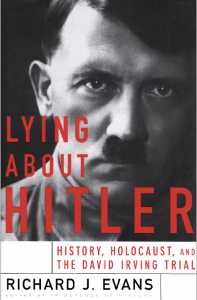From the previous discussion it can be established that denialism does not mean disagreement with the majority or even with the “everyone else” in the field or for having stand-alone “politically incorrect” beliefs: it is possible to disagree with “everyone” yet not be a denialist. How so? Richard Evans explained it by comparison of David Irving with another prominent historian I have also discussed from time to time, Eric Hobsbawm.
Further to the right of O’Brien, the columnist ‘Peter Simple,’ writing in the Daily Telegraph, considered it a “strange sort of country” which could consign Irving to “outer darkness while conferring the Order of Merit on another historian, the Marxist Eric Hobsbawm, an only partly and unwillingly repentant apologist for the Soviet Union, a system of tyranny whose victims far outnumbered those of Nazi Germany.” Leaving aside the numbers of victims, and ignoring the fact that Hobsbawm was not awarded the Order of Merit, which is in the personal gift of the queen, but was appointed a Companion of Honour, which is a government recommendation, the point here was, once more, that Irving did not lose his lawsuit because of his opinions, but because he was found to have deliberately falsified the evidence, something Hobsbawm, who in his day has attracted the most bitter controversy, has never been accused of doing, even by his most savage critics. (Evans , 238f)

